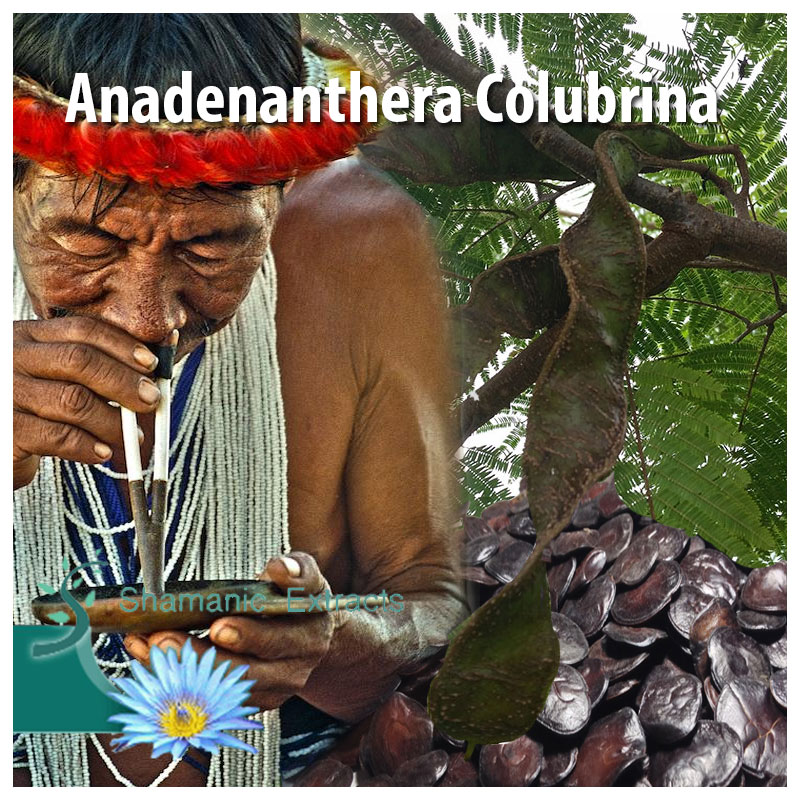

Anadenanthera colubrina (Cebil), a rare species that has been held as entheogenic for many centuries. Archaeological remains of Anadenanthera colubrina have been found all throuhout South America and the West Indies.
Black beans from Anadenanthera colubrina trees were toasted, pulverized and mixed with ashes or calcined shells to make psychedelic snuff called yopo by Indians in Orinoco basin in Colombia, Venezuela and possibly in southern part of the Brazilian Amazon.
Very few people know about Yopo in "modern" cultures, but they were and are very popular with the indigenous South Americans and Mexicans. It is estimated as much as 20% of the Maya were regular Yopo users. They are commonly called Cebil by the locals where the plants grow.
Yopo was and is blown into the nostrils through bamboo tubes or snuffed by birdbone tubes.
Plants containing entheogenic tryptamines are known around the world and are represented in nearly every Family. These plants commonly have an abundance of folk and medicinal history associated with their use. One well-known genus is Anadenanthera. Its use in snuff preparations through out the Caribbean Islands and South America is well substantiated. It is high in methylated tryptamines and has a long, documented history of use. Until recently there have been many overlooked aspects of this genus and those with similar chemistry. Their influence on art and culture and the uncanny resemblance in chemistry between that of plant and mammal must be explored. The use of Anadenanthera derived snuff contributes to the construction of belief systems. The seeds are considered a door, which allows access to a space where learning can occur. The seeds are a door where a being is found which enters into them by snuffing and acts as an intermediary between two worlds. Plants need full sunlight and prefer well-drained soil. Let the soil dry completely between watering. A. colubrina can handle some short term freezing conditions, but A. perigrina does not tolerate frosts.
Black beans from Anadenanthera colubrina trees were toasted, pulverized and mixed with ashes or calcined shells to make psychedelic snuff called yopo by Indians in Orinoco basin in Colombia, Venezuela and possibly in southern part of the Brazilian Amazon.
Very few people know about Yopo in "modern" cultures, but they were and are very popular with the indigenous South Americans and Mexicans. It is estimated as much as 20% of the Maya were regular Yopo users. They are commonly called Cebil by the locals where the plants grow.
Yopo was and is blown into the nostrils through bamboo tubes or snuffed by birdbone tubes.
Plants containing entheogenic tryptamines are known around the world and are represented in nearly every Family. These plants commonly have an abundance of folk and medicinal history associated with their use. One well-known genus is Anadenanthera. Its use in snuff preparations through out the Caribbean Islands and South America is well substantiated. It is high in methylated tryptamines and has a long, documented history of use. Until recently there have been many overlooked aspects of this genus and those with similar chemistry. Their influence on art and culture and the uncanny resemblance in chemistry between that of plant and mammal must be explored. The use of Anadenanthera derived snuff contributes to the construction of belief systems. The seeds are considered a door, which allows access to a space where learning can occur. The seeds are a door where a being is found which enters into them by snuffing and acts as an intermediary between two worlds. Plants need full sunlight and prefer well-drained soil. Let the soil dry completely between watering. A. colubrina can handle some short term freezing conditions, but A. perigrina does not tolerate frosts.